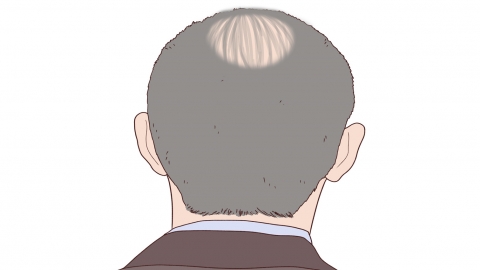What causes alopecia areata?
Generally, alopecia areata may be caused by factors such as high mental stress, genetic predisposition, abnormal immune function, endocrine disorders, infections, and others. It is recommended to seek timely medical consultation to identify the underlying cause and receive symptomatic treatment under a doctor's guidance. Detailed analysis is as follows:

1. High mental stress: Prolonged anxiety, tension, and insufficient sleep can impair scalp blood circulation and follicle nutrition, causing hair follicles to enter a resting phase, which leads to alopecia areata accompanied by patchy hair loss with clear boundaries, often occurring suddenly. Adjusting lifestyle, ensuring sufficient sleep, reducing stress through exercise or meditation, and maintaining emotional stability can help hair follicles gradually resume normal growth function, and hair may regrow naturally in the affected areas.
2. Genetic factors: Individuals with a family history of alopecia areata have an increased risk of developing the condition themselves. Genetic factors may make hair follicles more sensitive to certain stimuli, increasing susceptibility to alopecia areata, which often occurs during adolescence and may recur. Daily scalp care, avoiding frequent hair dyeing and perming, and minimizing follicle damage are important. Early intervention when hair loss occurs can help delay disease progression.
3. Autoimmune abnormalities: The immune system mistakenly attacks hair follicles, damaging their structure and halting hair growth, causing alopecia areata accompanied by smooth, non-inflammatory scalp skin. Some patients may also suffer from autoimmune diseases such as thyroid disorders or vitiligo. Patients should follow medical advice to apply topical medications such as halometasone cream, desonide cream, or mometasone furoate cream on the affected areas to suppress the immune reaction and promote hair regrowth.
4. Endocrine disorders: Endocrine issues such as hyperthyroidism, hypothyroidism, or abnormal sex hormone levels can affect follicular metabolism, leading to alopecia areata accompanied by symptoms like heat intolerance, cold sensitivity, and menstrual irregularities. Hair loss can improve after correcting hormonal imbalances. Specific treatments for endocrine disorders include levothyroxine sodium tablets or thyroid tablets for hypothyroidism, and methimazole tablets or propylthiouracil tablets for hyperthyroidism. Maintaining a regular diet and avoiding late nights can help restore hormonal balance.
5. Infections: Local scalp infections can disrupt the follicular environment, causing alopecia areata accompanied by symptoms such as scalp itching, flaking, and redness. Hair loss symptoms may improve once the infection is controlled. Patients should maintain scalp hygiene and, under medical guidance, use anti-infective agents such as ketoconazole shampoo, mupirocin ointment, or terbinafine hydrochloride cream to eliminate pathogens, reduce follicular damage, and promote hair regrowth.
In daily life, maintain scalp cleanliness and choose mild shampoo products, avoiding aggressive scratching. Increase dietary intake of protein and B vitamins, such as eggs, lean meat, and nuts, to provide essential nutrients for hair follicles. Gentle scalp massage on affected areas can enhance local blood circulation, support follicular recovery, and reduce the recurrence of alopecia areata.





